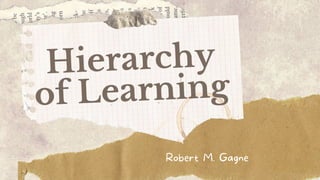Report
Share
Download to read offline

Recommended
Recommended
More Related Content
What's hot
What's hot (20)
IT for Higher Order Thinking Skills and Creativity (Educational Technology 2)

IT for Higher Order Thinking Skills and Creativity (Educational Technology 2)
Similar to Hierarchy Of Learning Gagne
Similar to Hierarchy Of Learning Gagne (20)
EDUCATIONAL TECHNOLGY - EDUCATIONAL TECHNOLOGY IN LEARNING AND DEVELOPING EDU...

EDUCATIONAL TECHNOLGY - EDUCATIONAL TECHNOLOGY IN LEARNING AND DEVELOPING EDU...
EDUCATIONAL TECHNOLOGY IN LEARNING & DEVELOPING EDUCATIONAL OBJECTIVES

EDUCATIONAL TECHNOLOGY IN LEARNING & DEVELOPING EDUCATIONAL OBJECTIVES
More from Blesson Varghese
More from Blesson Varghese (11)
Recently uploaded
God is a creative God Gen 1:1. All that He created was “good”, could also be translated “beautiful”. God created man in His own image Gen 1:27. Maths helps us discover the beauty that God has created in His world and, in turn, create beautiful designs to serve and enrich the lives of others.
Explore beautiful and ugly buildings. Mathematics helps us create beautiful d...

Explore beautiful and ugly buildings. Mathematics helps us create beautiful d...christianmathematics
Recently uploaded (20)
Asian American Pacific Islander Month DDSD 2024.pptx

Asian American Pacific Islander Month DDSD 2024.pptx
Measures of Central Tendency: Mean, Median and Mode

Measures of Central Tendency: Mean, Median and Mode
ICT role in 21st century education and it's challenges.

ICT role in 21st century education and it's challenges.
Ecological Succession. ( ECOSYSTEM, B. Pharmacy, 1st Year, Sem-II, Environmen...

Ecological Succession. ( ECOSYSTEM, B. Pharmacy, 1st Year, Sem-II, Environmen...
Mixin Classes in Odoo 17 How to Extend Models Using Mixin Classes

Mixin Classes in Odoo 17 How to Extend Models Using Mixin Classes
Energy Resources. ( B. Pharmacy, 1st Year, Sem-II) Natural Resources

Energy Resources. ( B. Pharmacy, 1st Year, Sem-II) Natural Resources
Explore beautiful and ugly buildings. Mathematics helps us create beautiful d...

Explore beautiful and ugly buildings. Mathematics helps us create beautiful d...
Basic Civil Engineering first year Notes- Chapter 4 Building.pptx

Basic Civil Engineering first year Notes- Chapter 4 Building.pptx
Presentation by Andreas Schleicher Tackling the School Absenteeism Crisis 30 ...

Presentation by Andreas Schleicher Tackling the School Absenteeism Crisis 30 ...
Hierarchy Of Learning Gagne
- 1. Hierarchy of Learning Robert M. Gagne
- 2. Robert M. Gagne American Educational Psychologist His book "The Conditions of Learning," first published in 1965, identified the mental conditions that are necessary for effective learning.
- 3. Gagne's Taxonomy of Learning also known as the Gagne Hierarchy or Taxonomy of Learning Outcomes, organizes learning outcomes into a hierarchical structure based on the complexity of mental processes.
- 4. Signal Learning A specific stimulus serves as a signal or cue for the learner to respond in a particular way. It involves the association between a stimulus and a specific response, often through repeated pairings. In signal learning, the stimulus serves as a signal for the learner to perform a specific action or response.
- 5. Stimulus- Response Learning It involves developing desired stimulus-response bonds in the subject through a carefully-planned reinforcement schedule based on the use of 'rewards' and 'punishments'.
- 6. Chain learning This is a more advanced form of learning in which the subject develops the ability to connect two or more previously learned stimulus-response bonds into a linked sequence. It is the process whereby the most complex psycho-motor skills (eg riding a bicycle or playing the piano) are learned.
- 7. Verbal Association Refers to the process by which an individual learns to associate words or phrases with specific meanings. It refers to the process of learning and remembering information through the association of verbal stimuli, such as words or verbal cues.
- 8. Discriminatio n Learning refers to the process by which an individual learns to distinguish between two or more stimuli or events. Item 1 Item 2 Item 3 Item 4 75 50 25 0
- 9. Concept Learning Refers to the process by which an individual learns to categorize or group stimuli or events based on their common properties or characteristics.
- 10. Rule Learning This is a very-high-level cognitive process that involves being able to learn relationships between concepts and apply these relationships in different situations, including situations not previously encountered. It forms the basis of the learning of general rules, procedures, etc.
- 11. Problem Solving Problem-solving refers to the process by which an individual identifies and resolves a problem or obstacle to achieve a specific goal.